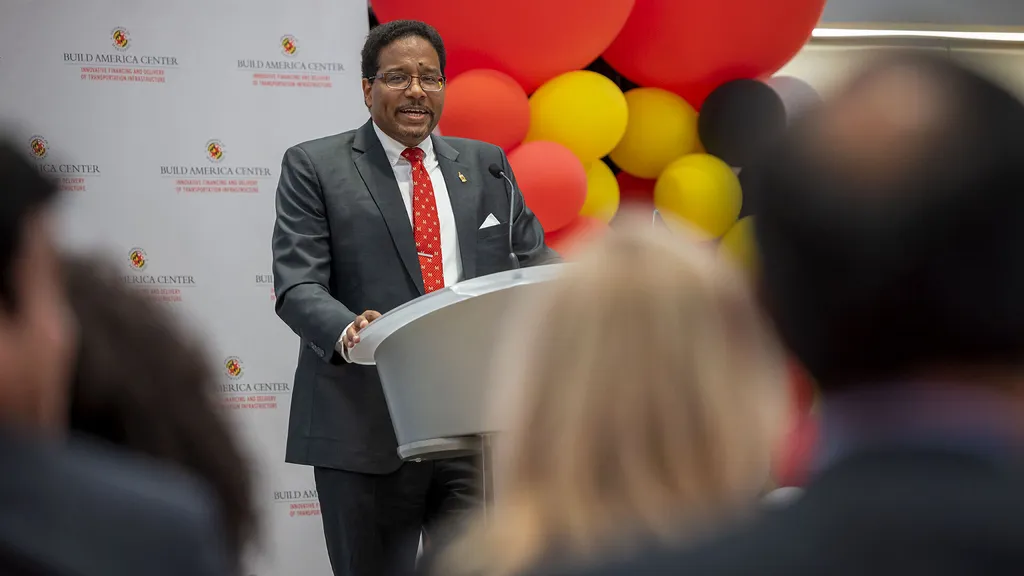- April 11, 2022
- By Robert Herschbach
Amid increasing fiscal challenges to building and maintaining U.S. road networks, the federal Department of Transportation has awarded $5 million to the University of Maryland to establish a national Center for Transportation Excellence that will help foster innovative avenues for financing highway projects, including through public-private partnerships (P3).
Known as the Build America Center, it will support the Federal Highway Administration (FHWA) and the Build America Bureau as they seek to foster new approaches to financing the construction and maintenance of the nation’s roadways. Four universities—Virginia Tech, Georgia Tech, Purdue and Stanford—will serve as regional leads for the new center, with UMD as national lead.
Historically, states have relied on taxation to build infrastructure, but that approach has become less sustainable as costs mount. Alternatives include P3, in which a state or local government contracts with a private company in order to carry out a project, as well as the use of toll revenues and financing instruments such as tax-exempt government-issued bonds.
The need for such approaches ramped up further because of the $1.2 trillion bipartisan infrastructure bill passed by Congress and signed into law by President Joe Biden in late 2021. Among its many other provisions, the law requires states to make greater use of innovative financing as they carry out highway and infrastructure projects.
Maryland’s A. James Clark School of Engineering is ready to contribute expertise and fresh approaches to finding solutions, said Dean Samuel Graham, Jr.
“Building a transportation infrastructure system that meets our future needs is a critical priority, and engineers are positioned to help address this challenge,” he said. “At Maryland Engineering, our students and faculty have the creativity and ingenuity to support our federal, state and local decision-makers in planning and building an infrastructure system that's sustainable and one that meets the needs of our society for years to come. We're grateful to the U.S. Department of Transportation for this opportunity to collaborate, and look forward to the innovations this partnership will bring.”

At a launch event for the center on Monday featuring federal and university officials and a range of expert panel discussions on infrastructure, UMD President Darryll J. Pines grouped American infrastructure issues with a range of problems the University of Maryland is devoted to tackling.
“If we are going to solve the grand challenges of our time, from climate change to social inequality, it will demand imagination and innovation in our infrastructure, from design and materials to financing, to technology and building longer lasting strategies,” he said. “We are thrilled to be part of this new initiative to implement solutions to create a more resilient, sustainable and equitable nation.”
Sam Beydoun, project management lead for the Build America Bureau, highlighted the advantages that UMD brings to the collaboration.
“As a research institution that has great expertise in education, UMD is in a strong position to support what we do at the Bureau in terms of educating project sponsors, state DOTs and local governments about the benefits of alternative project delivery and innovative financing,” Beydoun said.
UMD civil and environmental engineering Professor Qingbin Cui, an expert in transportation engineering and highway financing, will lead the endeavor, which also leverages UMD resources such as the Maryland Transportation Institute, the Center for Advanced Transportation Technology, the Center for Advanced Transportation Technology Lab, and the Project Management Center of Excellence.
“We are helping the FHWA and the Build America Bureau to perform cutting-edge research related to innovative financing, project delivery and policies, as well as providing training and professional educational services to state and local transportation agencies,” Cui said.
The Build America Bureau, founded in 2015 as part of the Fixing America’s Surface Transportation (FAST) Act, helps provide stakeholders with access to discounted financing, including through credit programs and grants, which can be used to fund projects with less reliance on taxes.
The bureau also organizes workshops, webinars, training programs, and other forms of technical assistance, many of which will now be supported by the UMD-led center.
Funding for P3 and other alternative financing-based projects often flows to smaller agencies that may not have sufficient experience and knowhow, thus making such assistance crucial, said Patrick DeCorla-Souza, P3 program manager at the bureau and at FHWA’s Center for Innovative Finance.
“For those that are unfamiliar with the process, it can seem complex. We hope, through the Center’s activities, to make it clearer to them,” DeCorla-Souza said.
